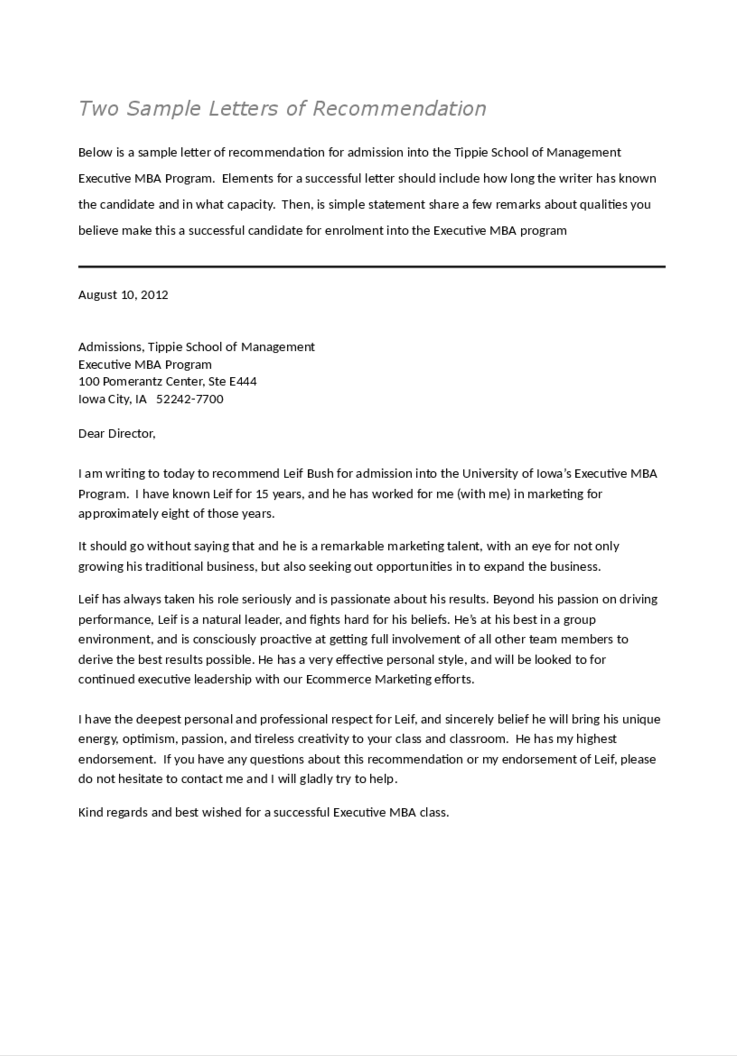
| Language | Free |
| Release Date | 1.0.0 |
| Genre | career |
| Author | Tippie School Of Management |
| File Size | Tippie School Of Management |
| Rating | (4.7) |
In some cases, there may be a reason not to write the letter of recommendation. The employee might have been terminated for cause or had an altercation with another staff member that ended their employment early and badly. In these situations, it’s best just not to say anything at all in order to avoid legal trouble down the road. Most employers will respect the request of an employee not to mention that they were terminated, fired or otherwise left under bad circumstances so long as it is made in writing and there’s no reason for them to suspect a problem with the former worker.
A letter of recommendation should be written on company letterhead, with the date and name of the employee to whom it is addressed. The company will put a stamp on it, but they usually don’t include their own letterhead in this case since there’s no reason for them to officially acknowledge that relationship between themselves and another person unless they’re trying to be deceptive by writing something for the benefit of someone else.
If you’re writing a letter of recommendation for an employee or former colleague, there are several things that you should keep in mind. One is to make it clear what position they held at the company so that other potential employers know how relevant their experience was and whether or not this will be useful information when looking over their resume. The other is to be brief and factual, which means not only sticking to the facts about their performance or duties but also avoiding any personal opinions as well (unless they’re really good).
The best way for you to write a letter of recommendation that will get requested by an employee who wants it isn’t to write it from the company’s perspective. Instead, take some time out of your schedule and just sit down with them for a few minutes so that you can tell them about their strengths as an employee or business partner instead. This is more personal than giving someone else advice on what they should say but less formal than a standard letter of recommendation, which means you can use whatever language comes to mind instead. Just be sure not to make any claims that aren’t true because this could cause problems down the road and put your reputation on the line whether or not they ever try using it as documentation for their employment history.
How a letter of recommendation reads will vary depending on who is writing it and what kind of job they want the employee to get. If you’re a supervisor, then your letter should be short enough that an employer can read over everything in about ten minutes or so (including how well their work habits were) but also detailed enough for them to get a good idea of their work history. If you’re a former employer, then the letter should be longer and more detailed for comparison purposes since employers will want to know about any areas where they might need improvement before committing someone else’s time and effort into them.
If you’ve been asked by an employee to write a letter of recommendation for them, then this can be an important piece in the job application process. The good news is that you don’t have very many pages or paragraphs on which to focus your thoughts and ideas when it comes down to writing out what they’ve been like as employees.
A personal letter of recommendation will typically be similar to a standard letter, but it can also contain more personal information as well. This is especially true if the person who asks you for your help has been working with and around you long enough that they have come up in conversation outside of work time which gives them insight into other parts of your life.
The best way to write a personal letter of recommendation for an employee who you’ve worked with in the past is by getting your thoughts down on paper and just letting them flow out onto the page. If they’re looking for something more formal, then it’s important that you remember not to use any slang or other informal language that they would use in everyday conversation since this can easily be misinterpreted by an employer or some other professional.
There are several common phrases and terminology used within the letter of recommendation industry, but it’s best to avoid them if you want your words to stand out on their own merit instead of having a professional writer come up with a better way to say it. Many employers will assume that if you’re an experienced professional then so is the person who wrote your letter and just copying something word for word off of their website or some other source like this would be counterproductive.
With all letters, both personal recommendations are formal, you should always start out with the date, your name and at least one line of contact information so that they can get a hold of each other if needed. For an informal letter in particular, it’s important to include any details about their personality or character as well since this is just part of how someone comes across when they’re interacting with you and other people.
A lot of times, a personal letter will be less formal than one that is written by a professional writer for an employer who wants to know more about their candidate’s work experience because it comes across as someone just sharing information rather than writing out something specifically for the purpose of getting someone a job.